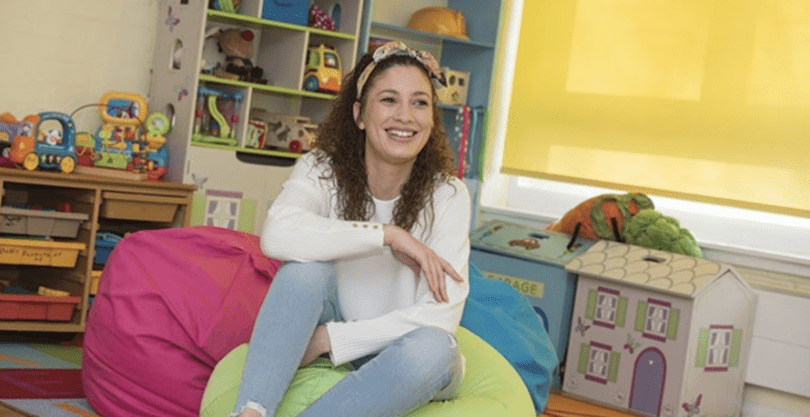
If you’d walked into Ria-Jaine Lincoln’s home several years ago, you would have found yourself surrounded by tin cans. Tin cans on every windowsill. Inside the cans were pound coins – these were the kind of tin cans with a hole in the top which you could put money into, but could only take back out if you had a tin opener and some serious determination. As well as coins, these tins contained dreams – a trip to New York, a holiday to Tenerife, a weekend at a music festival. Dreams that Ria-Jaine worked hard to make come true by being on top of her personal cash flow.
These are big dreams for most, but perhaps even more so for Ria-Jaine who’d studied to be an accountant whilst living in a women’s refuge with her two young children. Out of necessity, she’d had to apply her learnings about cash flow to her own personal circumstances, making sure she always had enough money to pay for her bus pass, childcare and bills. The cash flow management habits she developed during that time would last her a lifetime.
Nowadays, that cash flow expertise is helping her clients in the beauty industry find a way through the coronavirus crisis.
The beauty industry opportunity
“I made a bold claim: I wanted to be the accountant for the beauty industry.The amount of beauty business owners getting in trouble for late VAT registration is unbelievable. It became my mission to educate the beauty industry on everything they need to set up a business and be compliant.”
After graduating, Ria-Jaine landed a job at Deloitte, an opportunity she has described as life-changing. But eight years later, Ria-Jaine decided she needed more flexibility for family life and decided to retrain as a beauty therapist.
However, during training, Ria-Jaine noticed that as soon as she mentioned she was an accountant, she got lots of questions from her peers on financial matters. She also noticed the courses didn’t mention essential things like signing up with HMRC. Ria-Jaine could see there was a gap, and it was ready and waiting to be filled.
Suddenly, Ria-Jaine realised she didn’t want to give up accounting, not after all the hard work she’d put in to get her qualifications in such difficult circumstances. Instead, she chose to merge both passions. Ria-Jaine had a clear new goal: to become the go-to accountant for the beauty industry.
Creating an accountancy business
In the initial stages of setting up her business, Ria-Jaine did lots of trials of software she planned to use. She set about researching the best structure for her business and what tools might be helpful to her and her clients. She asked: what were others using? To reach clients on a big scale she had to go digital. And now she has clients in all corners of the UK.
Her strategy was to contact beauty shows and magazines to offer her expertise. Using social media for research, Ria-Jaine contacted beauty training centres and highlighted their social and professional responsibility to educate new business owners on how to set up a business and be compliant. She knew that beauty business owners were getting in trouble for late VAT registration because they simply do not know about it, and she decided it was time to help.
The firm was set up in December 2018, and Ria-Jaine secured her first client in February 2019.
“I’ve got clients up and down the country: Scotland, Wales, London, Manchester. I had to have the right software in place to make it easy for me to work with my clients remotely. Being digital was a must for me, from the very beginning.”
Today, Ria-Jaine Accounts is a digital accountancy practice based in Milton Keynes, where 90% of the work is done online. The rapidly-growing firm deals mainly with beauticians and salon owners, and offers a range of traditional accountancy and bookkeeping services, including self-assessment tax returns, company tax returns, VAT, PAYE, and payroll.
The most popular services Ria-Jaine Accounting offers are the packages. These special deals incorporate bookkeeping, cash flow management, profit and loss review, annual accounts submissions and all come with the appropriate software included.
Using cloud software and tech is essential to Ria-Jaine’s onboarding process. With flexible onboarding, she can bring clients on remotely and always be available to them. Ria-Jaine’s accounting software of choice is QuickBooks Online and it integrates seamlessly with Float, using real-time data for cash flow forecasting. As Ria-Jaine points out, using cloud-based software is much easier than emailing through a year’s worth of accounts. In late 2019, Ria-Jaine started using Float and has found its features – particularly scenario planning – to be central to cash flow forecasting with her clients.
Ria-Jaine has also become a respected voice on finance matters within the beauty industry. She writes a regular column in the UK’s leading professional nail magazine, Scratch, and regularly runs workshops for the beauty industry, delivering sessions on cash flow and how to structure bookkeeping and accounts.
The coronavirus crisis
When the coronavirus pandemic hit, like so many others, beauty businesses were devastated. Ria-Jaine’s clients were suddenly and unexpectedly dealing with the closure of salons, the risk of losing the businesses they had built up over years, and the anxiety of looking after their staff members under severe financial pressure. While some beauty businesses had a retail line that brought in a little money, most lost all forms of income practically overnight.
The business structure of many beauty salons complicated matters too, with many workers in the salon technically being classed as self-employed workers. Business owners that relied on sole trader income at their premises would not qualify for furlough payments. Home-based salons faced further problems as they don’t qualify for the business rates grant. And those with new businesses would not qualify for sole trader support.

As their trusted accountant, her clients turned to Ria-Jaine for advice on getting through the next few months. Ria-Jaine jumped into action and took a three-step approach to helping them look at their finances, with cash flow forecasting using Float as a priority.
The first step involved taking account of committed outgoings. Before any government support had been announced, she looked at what a business’s savings would cover if no income came in. It was essential to work out how far they would go into the red, if the worst case scenario did indeed play out.
The second step was to look at what payments could be put off, like VAT and PAYE deferrals, and what payment holidays were available. And when government support was announced, Ria-Jaine examined how much money each business would need to break even and stay afloat, and used this to guide the loan amounts applied for.
The third step was to think about managing the loan on a long-term basis and helping her clients spend the money on their business in the right way. When it comes to business loans there is lots to take into account. Should businesses pay back VAT deferrals from the loan? Keep the money as a buffer? Pay the loan back early if they can? There’s lots to consider in the immediate future, but also the long-term.
Throughout the above process, Ria-Jaine used Float to show her clients the impact certain decisions would have on their bottom line. She found the visual interpretation of the data presented in Float was a powerful tool to help her clients make decisions with confidence.
Cash flow forecasting, scenarios and business loans
“I think scenario planning is an amazing tool for my clients to use. It helps with strategy and planning because they can set a goal then work towards it each month.”
Ria-Jaine has seen many companies rushing in to borrow the full amount available from the government, such as Bounce Back loans in the UK. But warns businesses should proceed with caution, as if you don’t pay the loan back within 12 months, then the interest kicks in. There is also the issue that those with limited companies are taking money out of the loan for personal use, without realising this could result in charges of up to 32.5% on their director’s loan account.
Ria-Jaine finds it easier to discuss these different options with her clients thanks to the Float scenario planning tool. Mapping out different scenarios has given her a way to explain to clients in a simple, visual way the impact their current decisions will have on their business’s future cash flow.
For example, one of Ria-Jaine’s clients got a government loan and wants to invest the money in creating her own line of beauty products to sell. It’s a smart pivot for a beauty business to take at this unpredictable time. Using the scenario planning feature, Ria-Jaine demonstrated to this client the impact on their cash flow if they started selling the products in July. She also showed the predicted busy periods, such as the run up to Christmas. This gave her client an insight into when the new products would start generating profit for her business. Scenario planning has proven to be an invaluable tool for strategy and planning, setting goals and pricing for this client.
Another way Ria-Jaine uses scenario planning is to show clients the impact of taking on a new member of staff. Together they look at the increase in the business’s wage bill but also the increase in sales. Ria-Jaine uses this exact approach for planning the future of her own business too.
Looking to the future, Ria-Jaine plans to share the value of Float and cash flow forecasting with her client base more than ever before. Her forthcoming ‘mastermind package’ will include cash flow training for her clients, and we’ll be there to support her along the way with ongoing training and help with any questions that arise.
Planning for recovery
“All my clients are looking to the future and want to do better planning. They’re now more intrigued than ever by what’s going on in their accounts. They’re thinking about every single aspect of their business, which is a really good habit to get into.”
While this is undoubtedly a trying time for beauty businesses, there are some silver linings. Ria-Jaine has noted the changes brought about by the coronavirus pandemic has prompted discussions on business structure going forward. She believes the beauty industry is also waking up to better future planning. Previously, those running a busy salon had little time to look into their cash flow with any great detail. However, now her clients have the time and space to be more hands on, they often want to go through the details to fully understand their cash position. Luckily, Float makes this process quick and easy, thanks to its insights and clear visual elements.
Ria-Jaine believes an easy-to-use tool like Float can make cash flow forecasting a positive habit for beauty businesses. And when the beauty industry does eventually return to some form of normal, salon owners will be ready to hit the ground running with Ria-Jaine to support them.
Further reading:
https://floatapp.com/blog/long-term-cash-flow-forecasting-habit/
